sequitur (noun): the conclusion of an inference: consequence
Do you consider yourself a wordsmith, a connoisseur of lexicographical delights, a veritable exemplar of sesquipedalian predilection? If reading that sentence really gets your blood flowing, chances are you’ve played a few word games in your time and have relished those experiences. And, if reading that sentence fills you with dread, there’s a good chance that you’ve played a few word games in your time and have left those experiences feeling the exact opposite. Word games tend to reward those of us who are verbose while alienating those of us who just aren’t.
Games should be enjoyable. You should walk away from having played a game with friends feeling uplifted, filled with emotions of friendship and camaraderie, or, at the very least, enlightened. You should not walk away feeling belittled and stupid. All too frequently, at least one person walking away from having just played a word game walks away feeling the latter.
What if I told you that there was a word game that isn’t about the words? What if I told you there was a word game that doesn’t require you to be a walking dictionary? What if I told you that there was a word game where even the smallest words could lead you to victory? Well, believe it or not, such games do exist, and I’d like to introduce you to one now.
Welcome to Sequitur, a word game for those of us who love word games, but also for those of us who usually don’t.
Overview
Sequitur is a word game played with large Bingo-like balls. Each ball has a letter printed on it. At the start of the game, each player will draw a number of these and place them onto their rack. In addition to these starting letters, each player receives an identical collection of five Sequitur cards and a Bonus card drawn randomly from one of the three bonus card decks.
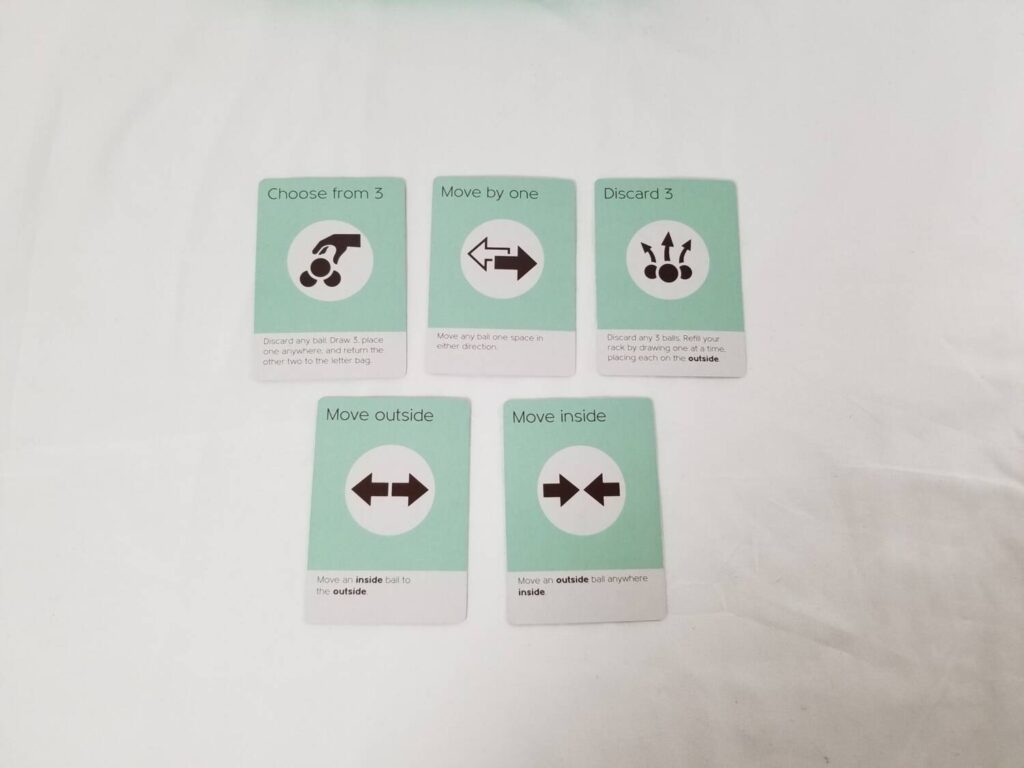
The game is played over three rounds. Over the course of a round, players will be adding Bonus cards to a public pool of them (or not), playing Sequitur cards from their hands to manipulate the letters on their rack (or not), before finally removing any unwanted letters from their rack to reveal their final word. Then, based on word score, players take turns drafting Bonus cards from the public pool (provided they can fulfill the goals they decide to draft) until there are no more Bonus cards that can be claimed. At the end of the third round, players add up their scores from their Bonus cards to determine the winner.
Of course, this is just a high-level overview of the game. If you feel like you’ve got the gist of it and just want to see what I think, feel free to skip ahead to the Thoughts section. Otherwise, read on as we learn how to play Sequitur.
Setup
First, separate the Bonus cards into face down stacks by their color. If fulfilled at the end of the game, these cards will be worth a number of points based on their color. Green cards are worth a single point and are generally easier to fulfill. Yellow cards are worth two and are slightly more difficult. Red cards are worth three and pose the greatest challenge.

Next, each player chooses a color and takes the matching rack and set of cards. Then, choose a starting player. That player draws 5 balls from the bag and places them onto their rack in the order in which they were drawn. Then, they will draw a card at random from the Bonus card stack of their choice. This card is the player’s secret objective. Finally, the player draws three more balls from the bag, one at a time, placing them on either end of their rack. This process is repeated for each player.
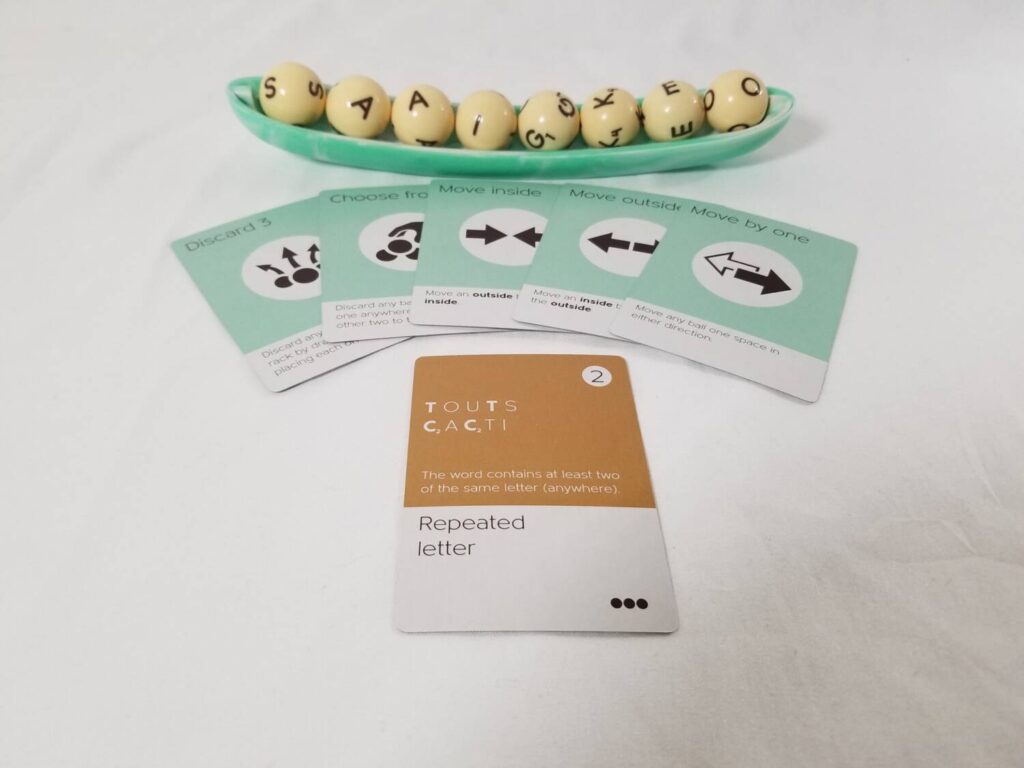
Once everyone has their starting rack of eight balls, you’re ready to begin playing Sequitur.
The Rounds
As mentioned earlier, Sequitur is played over the course of three rounds. Each round consists of the same series of steps, beginning with: draw 5 balls, take a Goal card, and draw 3 additional balls (adding them to whichever end of your rack you’d like). These steps are carried out in turn order, but the remaining steps can be carried out simultaneously.
First, each player will draw a card from the red Goal card deck, look at it, and then choose whether to discard it or add it to a face-up, public goals display. Once this decision has been made, the player will have the opportunity to use, at most, one card from their hand of Sequitur cards to manipulate the balls on their rack. Then, this same process is repeated twice more for the yellow and green Goal cards. When all is said and done, there could conceivably be a number of red, a number of yellow, and number of green Goal cards in the public goals pool equal to the player count, and each player could have played a total of three of their five cards.
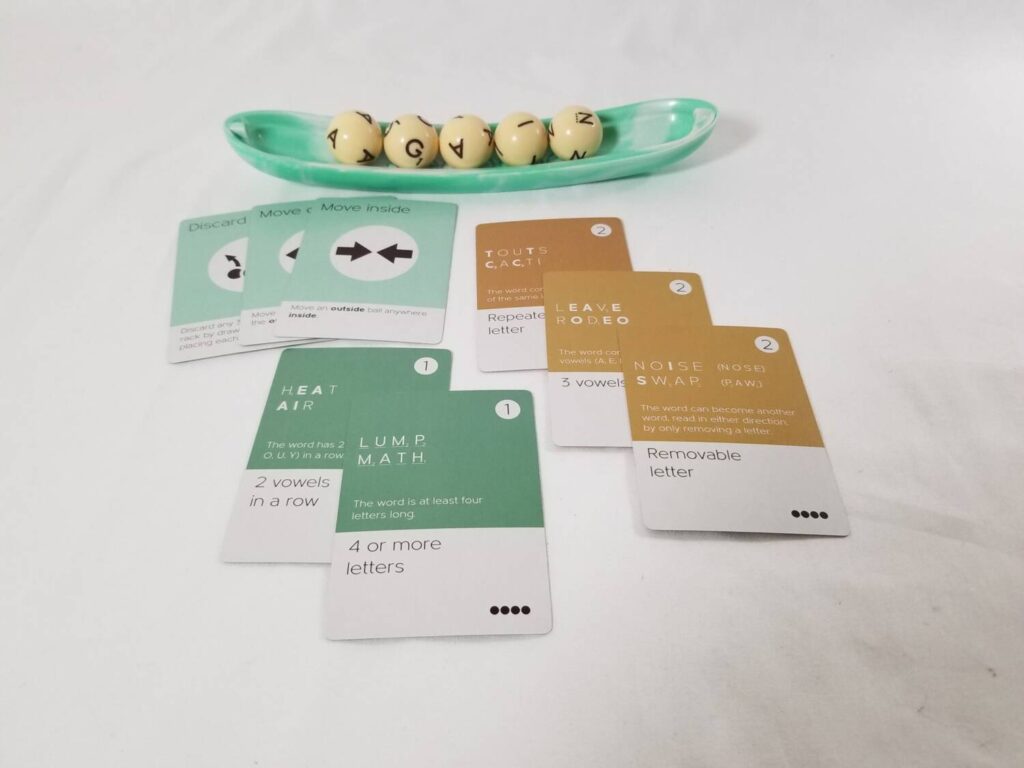
Once that’s done, the players will remove any unwanted balls from their rack to reveal their final word, which must consist of at least 3 letters. Then, starting with the player who has the highest scoring word (length of the word plus any ‘skill points’—i.e. numbers printed on the balls à la the harder to use tiles in Scrabble), the players take turns claiming goals from the public goal pool, as long as they have fulfilled whichever goal they’re claiming. If you can no longer fulfill any of the goals that are left, you’re out of the running. The other players keep taking turns claiming goals until no more can be claimed. Unclaimed goals are discarded, along with your personal goal if you were unable to fulfill it.
After three such rounds of play, the players add up the total of all the goal cards they collected during the course of play, and the player with the highest total wins.
Thoughts
For as far back as I can remember, I was always a word nerd. I remember finding this little pocket dictionary on my parents’ bookshelf, wafer thin pages like a Bible, that was jam-packed with not only words and their definitions, but their etymological origins as well. Learning new words was fascinating. Learning their origin stories was even more so. I carried that thing around everywhere, my nose pressed into its pages, absorbing every word like one would a popular Summer read. I couldn’t get enough of it.
So, it was no big surprise that once introduced to Scrabble, I took to it like Newton’s apple took to gravity. Scrabble’s pull on me was an inescapable force. To say that I became obsessed would be an understatement. At one point in time, I owned at least seven different versions of the game, multiple copies of the official Scrabble dictionary, and several strategy guides. I committed to memory the entire list of acceptable two-letter words, multiple six-letter stems, and every one of the unusual Q words (qat, qanat, qaid, qi, qopf, qiviut, faqir, mbaqanga, and tranq to name a few). In fact, the very night that I was first introduced to Catan, and thus catapulted into this amazing hobby, I was in the middle of a game of Scrabble.
It is because of that love affair I had with Scrabble that word games tend to grab my attention. But, it takes a really good word game to actually hold it, and Sequitur (despite its inaccurate name) has my attention well and fully held.
The first thing that draws you to the game is the visual appeal of the components on the table. The sturdy, plastic racks resemble vibrant, neon-colored, marbleized, banana split bowls. All the artwork in this game (what little there is of it) follows this same color scheme. This game, the colors say, is nothing to feel threatened by. Once the trays are filled with the bright yellow spheres, that non-threatening aspect is enhanced.
Sequitur is not a game to be afraid of. This isn’t one of those word games that requires you to have memorized the entire dictionary to do well. That’s because it’s not about the words so much as it’s all about meeting the conditions of the goal cards, and the players have a lot of agency over which goals are even out there in the first place. The only player agency you have in a game of Scrabble, for instance, is in choosing whether or not to dump letters from your rack in lieu of placing out any letters. Even then, you’re at the mercy of the random draw.
That isn’t to say Sequitur isn’t without some randomness. In fact, there’s quite a lot of it—the sequence of balls drawn during the initial bag draw, the actual values of said balls, and the cards drawn from the shuffled decks—but the game manages to not feel random. And, that’s an important distinction. Even though my brain is fully aware that a lot of how well I do or don’t do can be fully attributed to how lucky I get, Sequitur still manages to trick me into feeling like I have some control over my destiny. It’s a much more enjoyable experience as a result.
Sequitur works for two main reasons: firstly, unlike Scrabble which actively encourages you to constantly shuffle the tiles on your rack, in Sequitur, once they’re placed, you’re not allowed to move them save for the usage of one of your Sequitur cards (or spinning your rack 180 degrees, which is pretty ingenious), and these cards don’t do very much. They run the gamut of things like “move a ball from the inside to the outside” (and its opposite) to allowing you to discard balls to draw replacements from the bag, but there are limitations on where the newly drawn balls can be placed. Suffice to say, your options for rearranging the balls on your rack to form anything cohesive are limited.
This brings me to my only pain point with Sequitur. Because the options to move things around are so limited, your fate is essentially cast in stone from that very first bag draw. If you’ve got a bunch of letters that form some kind of word—any word—then you’ve got a spitting chance of doing well. But, if all your letters come up as pure nonsense, there is no way to mulligan to dump your rack and redraw those letters. I definitely think some kind of mulligan rule should have been put into place even if it meant drawing one fewer letter from the bag on your second draw.
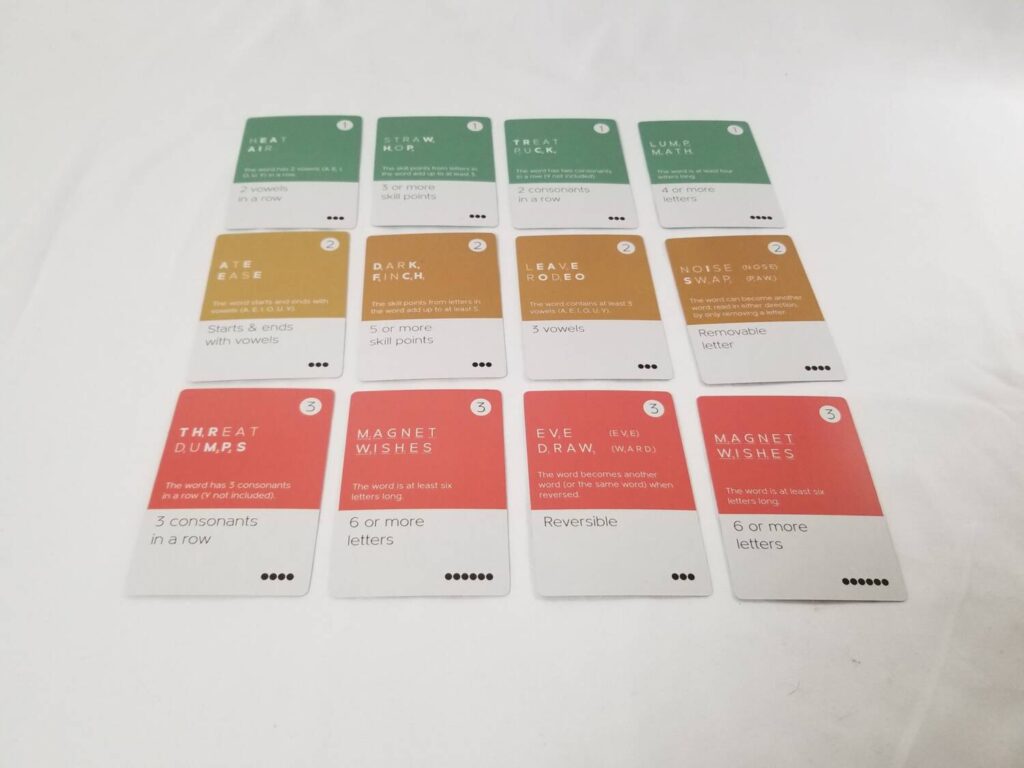
The second reason Sequitur works is because of the Goal cards. More specifically, the reason the Goal cards work is because the players are the ones introducing them into the public pool. When you draw a Goal card and consider whether or not to place it out as a public goal, there are a lot of variables you have to take into account. Is it a goal that you think you can fulfill? Is it a goal you think someone else can fulfill? Is there a goal already in play that you could fulfill even if you can’t fulfill the goal you’re holding in your hand? If that’s the case, do you put that goal out in the hopes that your opponents will go for it and leave the one that you actually can fulfill alone? Ultimately, unless you’re clearly in the lead on word score points (thereby giving you first dibs on the goal), anything you place out there is a gamble, predicated entirely upon what you know you can do and what you think your opponents might do. More so than the actual creation of the words themselves, the Goal cards are the heart and soul of the game.
In a recent game that I played, my first hidden goal rewarded me with points for beginning and ending my word with vowels (which is no easy task). Thankfully, I had drawn out a couple of As and the Q/Qu ball. I realized that, by shifting things around slightly, I could re-order them to spell the word AQUA, thereby satisfying my goal. I was open to changing my word, but as more and more goals kept getting played into the common pool, I realized that my word was a good word to capitalize on a number of them. That, in turn, made me think harder about which goals I put forth and which ones I didn’t.
Consisting of only 3 balls, AQUA is worth very little as far as a word score goes. I knew, since my word was worth less than the other three players’ words, that I would be drafting goals last. This not only informed my decisions as to what to put out there, but it also informed my decisions as to which goals I should draft first. When it came around to my turn to draft, I realized that there were at least three goals that I was eligible for, but only one of those goals was a goal that at least one other person could possibly pick up. So, I grabbed that one up first, safe in the knowledge that I was the only player that could complete the other two goals and would have no competition for them. That decision ultimately won me the game. I was able to squeak out a win by one measly point. Even with just a tiny little word, Sequitur gives you the tools to emerge triumphant. You don’t have to be a word whiz, or any kind of whiz, to understand how awesome that is.
So, if you’re a word game connoisseur, I think you’ll find that Sequitur’s your cup of tea. And, even if you aren’t, I think you should still give it a try. You’ll be surprised at just how accommodating Sequitur is. You’ll be even more surprised to find that you’re actually having fun.


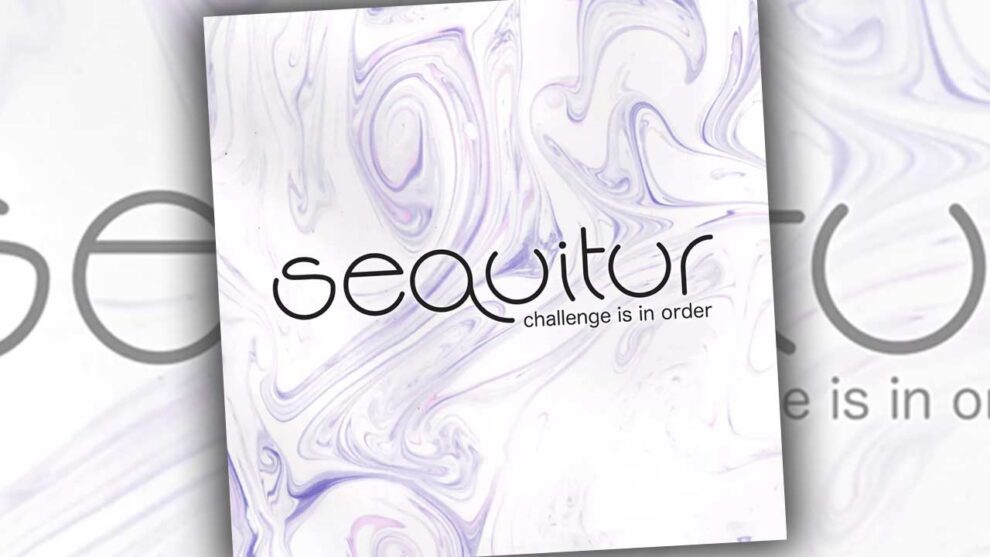


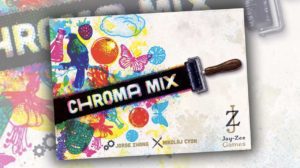





Add Comment